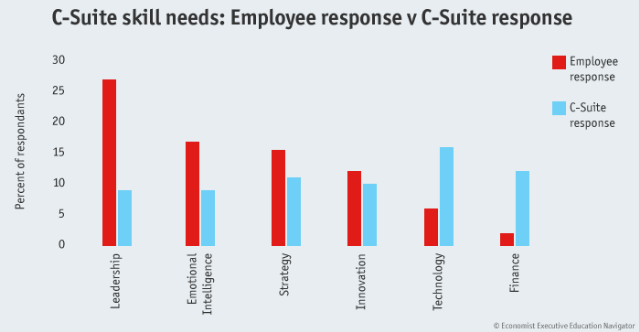Your employees want you, as leader, to become more emotionally intelligent. You, on the other hand, think your skill building priorities should focus on technology and finance.
Such was the disconnect, between employees and C-Suite executives, as this chart shows from a recent survey of 4,000 professionals, by The Economist.
Building emotional intelligence
In his groundbreaking book, Emotional Intelligence, Daniel Goleman says “emotion refers to a feeling and its distinctive thoughts, psychological and biological states, and range of propensities to act”.
Our feelings, and associated thoughts, are mostly internal, private to us. Our actions, and behaviours, on the other hand, are largely external, public.
So, how does one build awareness of our feelings and their linkage to our actions?
Team-building expert Kristin Arnold offered up a good list this week in 20 Tips to Build an Emotionally Intelligent Team; the results of her recent virtual panel with Scott Halford and Pamela Jett.
All very good tips.
What popped out to me, though, was how many of those tips dovetail with conflict management skills; e.g.:
- “It’s all about the ability to be the master of your emotions and not let your emotions master you”
- “Awareness is the biggest key to EI. You have to be aware and understand your own feelings”
- “We need to work on our own emotional vocabulary. A lot of people have very limited emotional vocabularies.” Someone might express that they are “angry,” when more accurately, they are frustrated, disappointed, feel ignored/undervalued, etc.”
- “You can’t manage other people’s emotions when you can’t understand your own.”
- “Get a baseline and understanding of your triggers so you can instill some rituals that will help you be more emotionally intelligent.”
Building emotional intelligence by increasing your conflict competency
Conflict competence and emotional intelligence go hand-in-hand.
How do we respond when our hot buttons are triggered or conflict is thrust upon us? Do we let our emotions rule us or do we have them before they have us?
Managing our responses to conflict demands self-awareness, of both our constructive and destructive responses to conflict. One de-escalates, the other escalates, conflict.
Differentiating and understanding our responses to conflict; e.g., expressing emotions, reflective thinking, retaliating, hiding emotions… provides us an opportunity to work on specific behaviours and a pathway to expand emotional vocabulary. Our cognitive and emotional sides intersect.
As a conflict management professional who has also been part of many a project and “team” endeavor over the years, I see conflict competent leadership as a cornerstone to collaboration success. To get there quicker, leverage assessment Instruments such as the Conflict Dynamics Profile (my choice). As you get to know your ‘hot buttons’ and conflict behaviours better, you’ll simultaneously be developing your emotional intelligence. Win-win!
Then, take it to the next level. Champion, model (the best way to teach?), mentor and coach others. Your employees will give you a 5-star rating.
Agreed?


Speak Your Mind